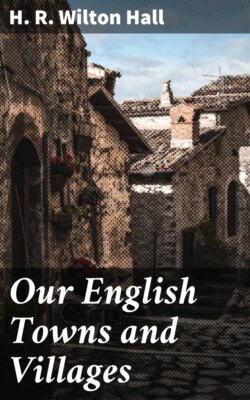Читать книгу Our English Towns and Villages - H. R. Wilton Hall - Страница 10
На сайте Литреса книга снята с продажи.
CHAPTER VI
EARLY SAXON TIMES
ОглавлениеTable of Contents
1. The conquest of Britain by the Saxons took a long time—considerably over one hundred and fifty years. A great many people are born, and live their lives, and die, in such a period of time as that. It was only little by little that the various tribes of Saxons got a footing in England. They were the stronger and fiercer race, and the Britons were gradually subdued or driven into the mountainous regions by them.
2. Those early tribes of Saxons, who came to Britain, brought with them their own special manners and customs. As they settled down, the face of the country was gradually changed by them. They disliked and suspected everything Roman, and destroyed the towns and villas. They hated the idea of walled towns. These, therefore, were left in ruins; and the great highways, being neglected in most places, were, in the course of years, overgrown with brushwood and hidden in thick forests.
3. In some parts of the country the Saxons seem to have completely swept the Britons away, and almost all traces of them vanished; but, in other parts, there certainly were some of them left, because we have still their marks upon our language. Although most of the place-names in use now are Saxon or Danish, there are still a good many of British, or partly British, origin.
4. The names of many of our rivers are British or Celtic, such as Axe, Exe, Stour, Ouse, and Yare. So are many names of hills; and, in some parts of the country, the names of the villages are partly British and partly Saxon. Take, for instance, such a common name as Ashwell. Some learned men think that it is made up of two words, Ash and Well, both meaning pretty much the same thing, ash being British for "water", and well being Saxon for "watering-place". Now, if the Saxons had quite got rid of the Britons, they would not have known that a particular place was called "Ash"—they learned to call it "Ash" from the natives, but they did not know what it meant. They knew that there was a spring of water there, which they called a "well"; and so, to distinguish it from other wells in the neighbourhood, they got into the habit of calling it "Ashwell"—and the name has stuck to the place.
5. In some such way as this many other place-names, partly British and partly Saxon, were formed; and they teach us this, that Saxons and Britons must have lived near each other closely enough for the Saxons to take up and use some British names.
6. There are some English counties in which you will hardly find one place-name which is not Saxon. This shows us that the Britons were either killed or completely driven away. That is the case in Hertfordshire. But in Hampshire, while most of the names are Saxon, there are many partly Saxon and partly British. This same thing can be noticed in the county of Gloucester. The Britons, then, must have been in these districts long enough for the Saxons to pick up a good many place-names. They did not understand the meaning of them, and so tacked on to them names which they did understand.
7. The Saxons made their settlements at first away from the Roman towns and British villages. In the course of time, in a good many cases, they made settlements very close to these old sites, and we know that Saxons lived in such places as Winchester, Gloucester, and London. We find, especially in Hampshire and Gloucestershire, that near, or in, certain villages with Saxon names, Roman remains have from time to time been dug up.
Summary.—The Saxon conquest was gradual. At first the invaders destroyed and avoided the remains of Roman cities. In some parts of the country the Britons were swept quite away, and British names forgotten. The old place names in some places show that the Britons and Saxons must have lived side by side, as was the case in Hampshire and Gloucestershire. In others, as in Hertfordshire, the Britons quite disappeared, as nearly all the place-names are Saxon. Roman remains have been found in some places with Saxon names, which seems to show that after a time the Saxons took to some old Roman sites for their dwelling-places.
